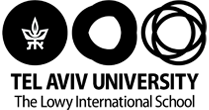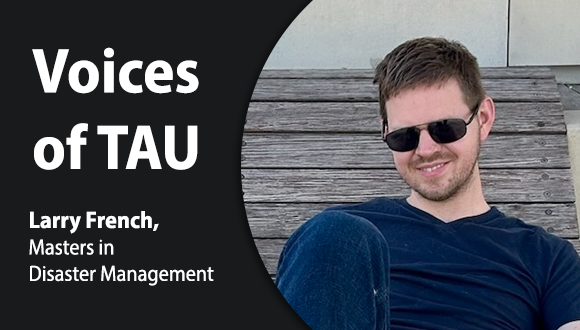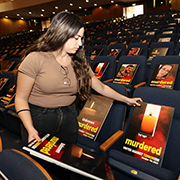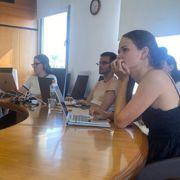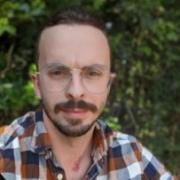Voices of TAU: "We Feel Safe and Comfortable Here"
Master of Disaster Management student at the Lowy International School reflects on current events, studying, and living in Israel
Larry French, from North Carolina, US, arrived in Tel Aviv on October 5 with his wife to start his master’s in Emergency and Disaster Management at the Lowy International School.
Despite the outbreak of the war two days later, Larry has decided to stay on and carry on with his studies. In an interview with the Lowy International, Larry talks about adjusting to life in Tel Aviv under the new circumstances, volunteering, and his classes.
Deciding to Stay in Tel Aviv
We woke up Saturday morning [October 7 — ed.] to sirens and I first thought that we had no idea what to do (we were staying at an Airbnb at the time). Before coming to Israel, we did a little research online about what kind of hazards there were, and we knew sirens existed.
That first time was kind of chaotic for us because there were a lot of things we didn’t understand. We since took the time to learn where the shelter was and what we’re supposed to do. Our neighbors have been truly great — they gave us their phone numbers, and have been checking in on us.
My wife and I both have a background in disaster management, so there is actually not as much pressure for us to go back to the US as we thought there would be because our families trust our judgment.
If we don’t feel safe, we’ll leave, but until that happens, we’re going to stay. There is a system that protects us here.
Now we’ve gotten used to the sirens — we’ve been to the shelter 22 times since we got here. Our families back home keep asking if we feel safe here. We do — we know where to go, we know where the shelters are and we know what to expect. We feel comfortable with that.
Joining the Student Task Force
Initially, I was trying to find something to do when the university delayed classes, so when I saw the email asking for students to join the task force [student initiative aimed at combating misinformation regarding the October 7 attack on Israel - ed], I sent my resume. I needed something to do and this is a great opportunity to get involved.
I get to do something that feels like making a difference and supporting the efforts to deal with misinformation about what is going on.
The task force is a great way to meet students I wouldn’t have otherwise met. We have over 50 students from about 9 countries at the moment and another 30-40 on the pending list. There are public relations people, social media experts, activists, newspaper editors, and journalists on our project. We also have an entire team whose goal is to validate every piece that we’re sharing to make sure that it’s proven, accurate and coming from a reliable place.
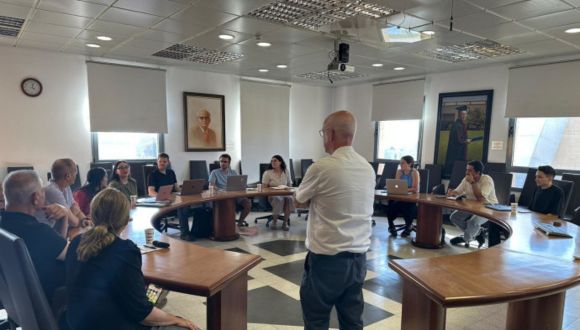
A taskforce meeting
My current role on the project is volunteer management, recruiting, and onboarding. I screen the applications as they come in and find the spot on the team for people. In my previous jobs, I did a lot of volunteer management, so I feel very comfortable doing that.
What’s nice is that as we get to know the students and their background we can find the perfect role for them. Our teams really excel. Now we are trying to fill the spaces so that as we get back to school and get busier, we have three people doing one job to make sure it always gets done.
Sharing First-hand Accounts of Events
I hear from our families back home and see on social media that people are getting information that is not really accurate. So it’s important for me to be able to share those stories from my perspective here in Israel. The goal of a lot of media is to try to sound as big and flashy as possible and some of what they are saying is exaggerated. One of the goals of the task force is to say what is actually true and to tell people what’s going on here.
Some people are just not going to change their opinions, but there are a lot of people who may if they see that the information they’re relying on is neither full, nor accurate.
We share validated information with some pre-selected groups – on social media, with college campuses around the world, with academic groups, hospitals, and professional organizations – people who have an interest in this, but may not have accurate information.
What we’re trying to say is ‘this is the accurate validated information that we got from a reliable and trusted source’ and encourage them to share it with their contacts instead of trusting any number of media that may or may not be accurate.
Life Outside of Classes and Volunteering
My classes are in the afternoon. The task force is spread throughout the day. We usually start our day going for a mile-long walk with our dog. We are using it as an opportunity to explore, going in different directions every day.
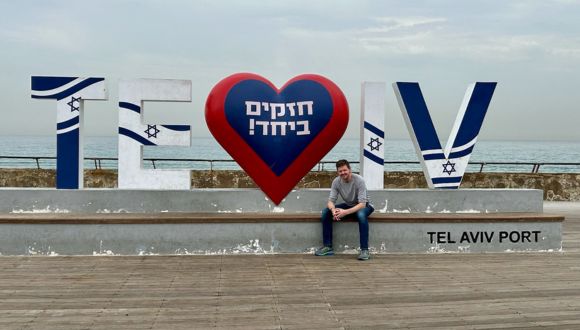
Just recently we found a burger place we want to try. We’ve also discovered a Thai restaurant that we like. When we’re traveling on the bus and see a restaurant that looks good, we’ll mark it down on google maps to try to come back there. We’re also trying to get settled, make our apartment feel like home, and feel comfortable.
It’s been fun because there is so much to do here.
We love to travel, but we are here for the whole year, so we want to spread it out and not do every single thing in the first few weeks.
It’s good that we have time to try everything we can. We are excited for so many things: we want to go to Bethlehem, the Red Sea, Eilat, and other places. We’re also planning on going to Jerusalem later on.
We were surprised with how much English there is here.
Our big fear was that we know very little Hebrew. Most signs are in Hebrew, but we’re finding that when we talk to people, we’d start our conversation practicing our Hebrew, they’ll ask us a question, get a blank face, and switch to English because they know that we didn’t get it. It’s really great that people understand that we’re trying to learn — they slow down and help us practice phrases and words.
Choosing to Study in Israel
Part of the reason I’m getting a Master’s in Emergency and Disaster Management here in Israel is because Israel is a country that is very well versed in emergency and disaster management. I’ve worked in this field for 12 years and I knew that if I chose a Master’s in the US they would teach me the names of the concepts that I already know from experience.
I wanted a different perspective from what we have in the US.
In one of my previous jobs I hired a girl who went through this program here at TAU and talked very highly about it. That was three or four years ago, so when I finally decided to go back to school and do my master’s I decided that this program is for me.
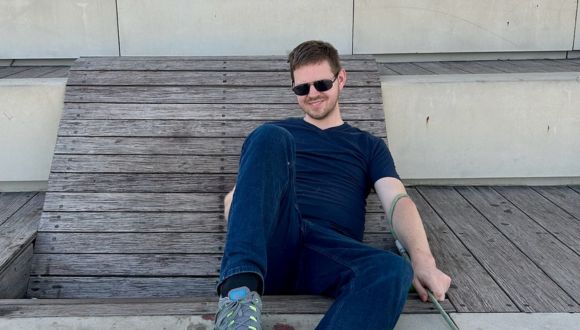
First of all, Israel knows about disaster management at a level that the US only wishes they knew. Also, I get to hear different perspectives from students from other countries and backgrounds on how the rest of the world does it.
I’m really excited to be taking the program here because this is the kind of education I would never get in the United States
During the first week of classes, it’s been mostly previews of syllabus. We’ve also talked about some of our projects and I’m hoping to do an internship later. We know that we’ll be doing special visits to operation centers of hospitals, emergency operation centers, and the IDF. I’m looking forward to seeing behind-the-scenes how systems actually work here compared to the US.
I’m particularly interested in the Crisis Communications course that’s taught by a spokesperson for the IDF, who is obviously an expert in crisis communications.
A big portion of emergency management is getting people to do what you need them to do, and a big portion of getting them to do what you want them to do is giving them the right information about expected actions. That is something we struggle with in the United States — people do not follow instructions. They hear a hurricane warning, but stay home anyway and have to be rescued later on.
Here in Israel, people know what they need to do in times of disaster and they do it. So it would be great to see how crisis communications are used here to get people to respond the way they do.
Larry French studied for his bachelor’s in Criminal Justice at the University of Maine. After that, he went into law enforcement, working in policing, college security, and also taking on roles of a firefighter and an EMT. He also did a lot of work for non-profits – working in disaster management for the American Red Cross and then getting involved in disaster management in public health during COVID.
His last role was at a hospital in emergency management. Larry’s goal is to work in government doing emergency management at a city or county level.
